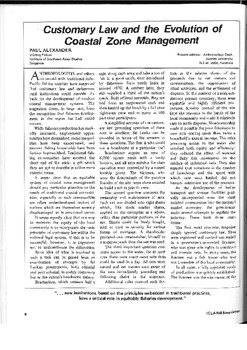Please use this identifier to cite or link to this item:
https://hdl.handle.net/20.500.12348/3670
Customary law and the evolution of coastal zone management
| dc.creator | Alexander, P. | |
| dc.date.accessioned | 2019-06-28T10:02:48Z | |
| dc.date.available | 2019-06-28T10:02:48Z | |
| dc.date.issued | 1980 | |
| dc.identifier | in_3410.pdf | |
| dc.identifier.citation | ICLARM Newsletter 3 (2): 8-9 | |
| dc.identifier.uri | https://hdl.handle.net/20.500.12348/3670 | |
| dc.description.abstract | Although fisheries production in the Indo-Pacific has markedly increased, employment opportunities have diminished, social inequalities have been exacerbated and peasant fishing households have been further impoverished. Thevarious reasons as to why this has occurred are considered. It is thought that an equitable system of coastal zone management should pay particular attention to the needs of traditional coastal communities, especially as such communities are often underdeveloped sectors of nations which are severely disadvantaged in international terms. | |
| dc.format | application/pdf | |
| dc.language | En | |
| dc.publisher | ICLARM | |
| dc.rights | CC BY 4.0 | |
| dc.source | ICLARM Newsletter | |
| dc.title | Customary law and the evolution of coastal zone management | |
| dc.type | Journal Article | |
| dcterms.bibliographicCitation | Alexander, P. (1980). Customary law and the evolution of coastal zone management. ICLARM Newsletter 3 (2): 8-9 | |
| cg.identifier.worldfish | 3410 | |
| cg.subject.worldfish | coastal zone management | |
| cg.subject.worldfish | fisheries management | |
| cg.subject.worldfish | law and regulation | |
| cg.contributor.affiliation | Sydney University | |
| cg.identifier.status | Open access | |
| cg.description.theme | Resilient small-scale fisheries |
